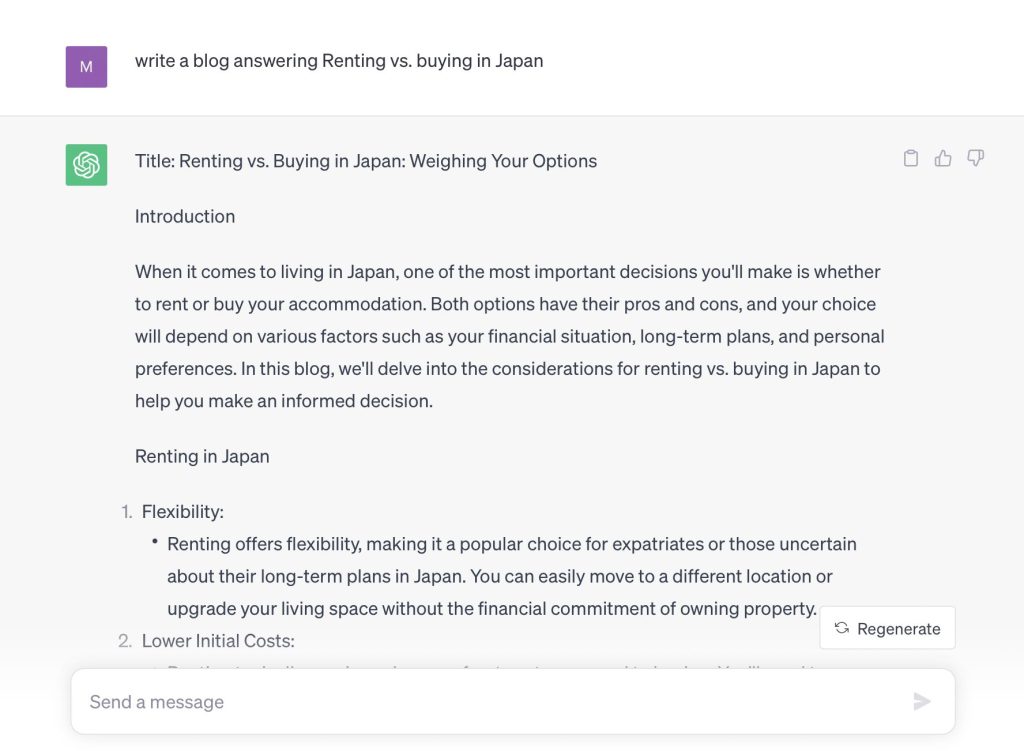
When it comes to living in Japan, one of the most important decisions you’ll make is whether to rent or buy your accommodation. Both options have their pros and cons, and your choice will depend on various factors such as your financial situation, long-term plans, and personal preferences. In this blog, we’ll delve into the considerations for renting vs. buying in Japan to help you make an informed decision.
Renting in Japan
- Flexibility:
- Renting offers flexibility, making it a popular choice for expatriates or those uncertain about their long-term plans in Japan. You can easily move to a different location or upgrade your living space without the financial commitment of owning property.
- Lower Initial Costs:
- Renting typically requires a lower upfront cost compared to buying. You’ll need to pay a security deposit, key money (a non-refundable gift to the landlord), and agency fees, but these are usually less than a down payment for a property.
- Maintenance and Repairs:
- Maintenance and repair responsibilities often fall on the landlord, reducing the stress of unexpected expenses that homeowners might face.
- Location Choices:
- Japan’s major cities offer a wide range of rental properties, allowing you to live in prime locations without the steep costs associated with buying.
- No Property Tax:
- As a renter, you won’t be responsible for property taxes, which can be significant in Japan.
Buying in Japan
- Investment and Equity:
- Buying a property can be a smart financial investment. Over time, you build equity as you pay off your mortgage, potentially increasing your net worth.
- Stability:
- Owning a home can provide a sense of stability and security, especially if you plan to stay in Japan for the long term.
- Customization:
- Homeownership allows you to customize your space to your liking without needing permission from a landlord.
- Property Appreciation:
- In some areas, property values in Japan have shown appreciation over time, potentially resulting in a profitable sale in the future.
- Tax Benefits:
- Japan offers various tax incentives for homeowners, such as deductions for mortgage interest and property tax credits.
Considerations for Both Options
- Financial Situation:
- Evaluate your financial stability and ability to secure a mortgage. Renting may be the only option for those without significant savings or a stable income.
- Long-term Plans:
- Consider your long-term plans in Japan. If you’re uncertain about how long you’ll stay, renting may be more suitable. For those planning to settle down, buying might be advantageous.
- Market Conditions:
- Keep an eye on the real estate market. Property prices and rental rates can vary greatly depending on location and economic conditions.
- Lifestyle and Personal Preferences:
- Consider your lifestyle and personal preferences. Some people prefer the flexibility of renting, while others prioritize the stability and control of homeownership.
Conclusion
The decision between renting and buying in Japan ultimately depends on your unique circumstances and priorities. Renting provides flexibility and lower initial costs, while buying offers long-term stability and potential financial benefits. Carefully evaluate your financial situation, long-term plans, and personal preferences to make the right choice for your Japanese living experience. Remember that both options have their advantages, and the ideal choice for one person may not be the same for another.

